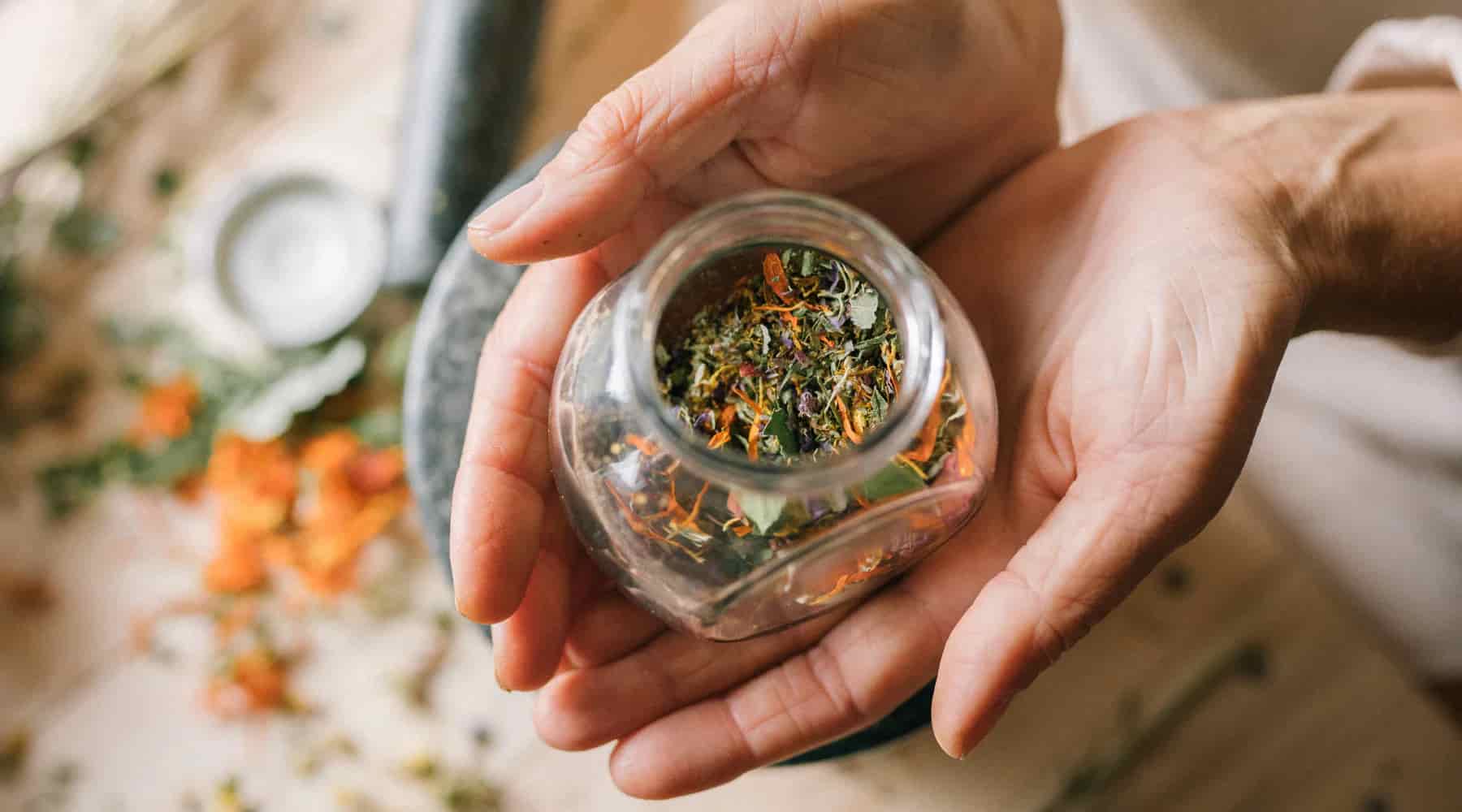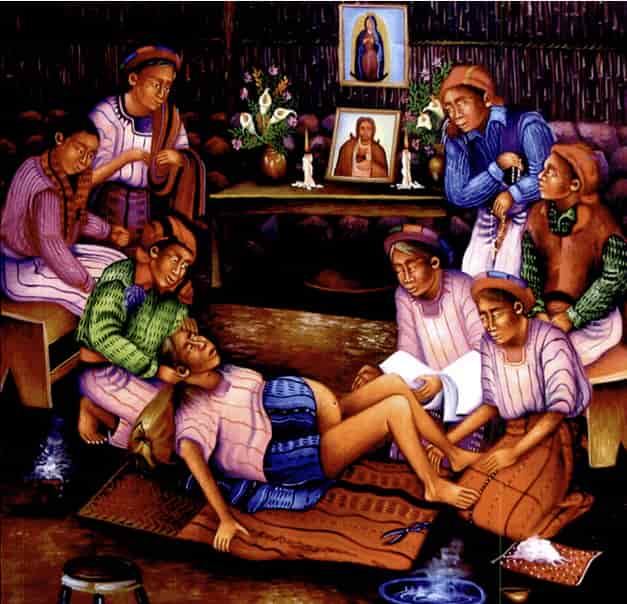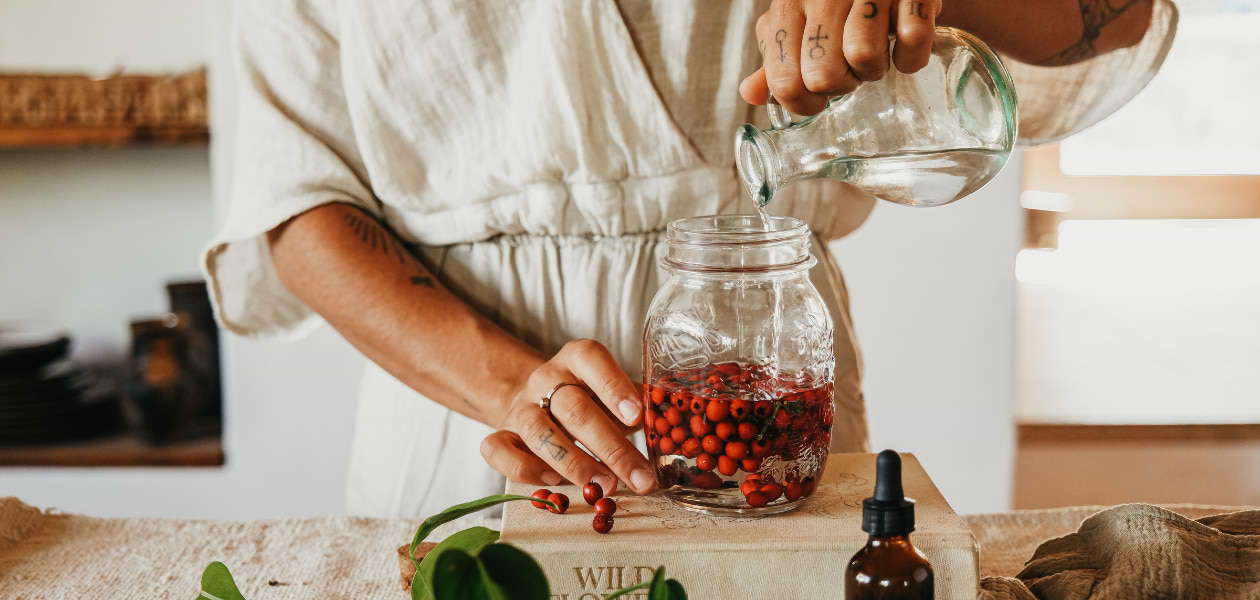What is Herbalism
You have probably landed on this article because you are curious or passionate about herbalism and perhaps even interested in becoming an herbalist. There are myriad ways in which to engage in the study and practice of herbalism. Before we dive into some of those options, let's pause to consider what herbalism is.
Herbalism has been in existence for centuries—truly, the use of plants to improve health; to enhance cooking, beverages, and beauty products; and to soothe ailments of all sorts likely dates back to time immemorial. Herbalism is a holistic approach in which whole plants (rather than isolated constituents or phytochemicals) are used to support health and/or lessen illness.
In most herbal practices, the overall picture (health, constitution, pattern of symptoms) of the individual is considered and an herbal protocol may be part of a larger plan that includes modifications to diet and lifestyle.
What is an Herbalist
First off, there is no single way to be an herbalist or to engage in herbalism. There are many herbal enthusiasts who engage in herbalism purely for the love of the subject—perhaps to support their health and that of their friends and family, and to enjoy the many benefits (and wonderful flavors and aromas) that plants offer.
Upon reflection, you may find that herbs are already part of your life in a number of ways. There may be herbs such as lemon balm, basil, red clover, mint, or rosemary growing in your garden or backyard. You probably already use herbs such as parsley, thyme, sage, rosemary, and cilantro to season your food. Or, consider any herbal teas you enjoy and even the ingredients in your skin care products—when you take a look around, herbs are everywhere!
What Is Your Relationship To Herbalism?
When making an initial dive into herbalism, it may be interesting to ponder your story and relationship with plants. Some folks who study herbalism or become herbalists recall having had a curiosity about herbs that dates back to childhood. Others find their fascination with herbalism later in life. Some people descend from an unbroken family tradition of herbalism while others find their herbal path outside of their biological family and ancestral traditions. What we so often say to our Herbal Academy students is there is no one right way to be an herbalist or to engage in herbalism. It can be illuminating, however, to explore your personal story with herbalism (which may certainly evolve over time) and to seek out a variety of learning opportunities that will support you on your unique herbal path, and that will ultimately enrich your understanding of the subject.
5 Ways To Kickstart Your Herbal Studies

If you are eager to dive (or dip your toe) into herbalism, be it for an interest in herbalism as a potential career path or simply (and equally valid) as a passion project, here are a few great places to start. As is often the case for starting something new, taking small, manageable steps that feel joyful and integrated into your life can be a great place to start. You never know…that little flame of curiosity may grow over time into a full-fledged burning interest and hunger for learning. Whether you wish to dabble or dive in head first, here are five fun ways to kickstart your herbal studies.
1. Learn herbalism by focusing on one plant and one preparation at a time
Many experienced herbalists including Herbal Academy educators will offer the guidance that developing a relationship with one herb at a time is an excellent way to learn herbalism. When you learn a lot of little things, it eventually adds up to something big. Also, by taking the time to develop deep relationships with a small number of plants, your understanding will slowly but surely build into a body of knowledge that is more thorough and integrated than your experience might be if you were to study many herbs superficially.
Here is an example of how to develop a relationship with one herb at a time: Pick an herb that you are drawn to or that is easily accessible for you. For instance, if you like mint (Mentha spp.) and it grows abundantly in your garden, try enjoying mint tea a few times per week. Notice the taste, aroma, and effects of drinking mint tea. How does it make your body and mind feel? Try using mint in a variety of recipes. Add fresh mint leaves to salads or try out a few special recipes that use mint such as this Green Pea Hummus Recipe with Fresh Mint or this Cooling Cucumber Mint Limeade for Hot Summer Days. You might also do some reading on the energetics, benefits, and usages of mint. You can look these up in a beginner-friendly herbalism book or check out online resources, such as our blog post, 3 Supportive Uses for Peppermint You Need to Know.
Bonus: Create your own herbal materia medica
On the topic of studying one or a few plants at a time in depth, another great way to do this is by creating your own herbal materia medica. A materia medica is a body of knowledge that describes how plants are used for their health benefits and in herbal preparations. There are examples of both ancient and modern materia medica. You can read more about the origins and use of herbal materia medica in our blog post, What is a Materia Medica? Also, why not get started and gain some hands-on experience? Access this materia medica free download or even expand your learning with the Herbal Materia Medica Course (including a beautiful keepsake journal for your plant studies).
2. Explore benefits of herbs in a way that is already woven into your life
There are a multitude of ways in which to develop a relationship with herbs. What are your interests, your creative practices, and what feels natural to you? If you have a green thumb, try adding herbs into your garden and begin working with them and studying them through observation and relevant reading materials. If you have a love for cooking, explore culinary herbs and spices and learn the properties of these allies you might already be working with.
Ultimately, just look for some ways to use more herbs in your everyday routine and learn about them as you go! Search around the web to find a favorite herbal blog for projects and recipes that incorporate herbs if you need inspiration. If you enjoy visual arts, explore photographing, drawing (we love this botanical sketchbook), collaging, and/or painting with herbs.
3. Acquire some beginner herbalism books
Getting your hands on a few beginner-friendly herbalism books is a great way to build up your foundational knowledge in herbalism. You can check out this helpful Herbal Bookshelf for ideas. Just as it is easy to get overwhelmed by studying too many herbs at once, attempting to read from multiple herbalism books simultaneously can also lead to mental overwhelm. Perhaps start with just one or two books that particularly appeal to you. You can slowly amass an herbal library over time. Also, no need to spend a fortune on book purchases. Look into used books, free libraries, or even check some out from your local library.
4. Subscribe to herbal newsletters for free education and tune into herbal podcasts
There is a wealth of herbal information in the digital world. From blogs to newsletters to podcasts, there is an abundance of written, spoken, and visual media on herbs. The Herbal Academy newsletter is just one place – and it offers free herbal education each week in the form of resources, recipes, ebooks, and updates on events and herbal courses.
In addition, listening to an herbal podcast, or following along with your favorite social media accounts and YouTube channels is a fantastic way to learn about herbs and to hear from experts in the field. Pop on an herbal podcast while driving, doing house chores, or whipping up your new favorite herbal creations.
5. Take an herbalism course
Commencing a formal education in herbalism doesn't have to be overwhelming! You may want to attend herbalism talks or weekend courses in your local area. There are also many options for online learning in herbalism. Taking your learning in manageable chunks will be more likely to set you up for success in the long term.
Here at the Herbal Academy, we offer an assortment of beginner-friendly courses online that can be completed at your own pace. The Making Herbal Preparations 101 Mini Course, an easy entry program that will get you hands-on with beginner-friendly herbs, and the Introductory Herbal Course, the best place to begin your herbalism studies to build a solid foundation, are both great places to start learning herbalism. If you enjoy this method of learning, there are plenty of options for deepening your understanding over time, such as our Intermediate Herbal Course and Advanced Herbal Course. Many herbalism schools offer a variety of learning opportunities, so do a little research to find out which courses are most compelling to you.
A Note on Herbalism as a Career Path
If you are pondering herbalism as a career path, the options are not limited and we encourage you to explore your interests! In the United States, herbalism is not a federally regulated licensed profession, as is the case for becoming a doctor, a nurse, or a chiropractor. This is not to say that herbalism is not a viable profession that requires significant training. There are many options for studying herbalism formally as well as for working professionally as an herbalist, such as becoming a clinical herbalist, creating herbal products, teaching, and writing about herbalism.
You may wish to consider how you envision your herbalism practice. Do you see yourself as an educator or clinical herbalist? Do you dream of creating botanical skincare products or perfumes? Are you primarily interested in writing about herbalism and/or creating course content? Or, is it your primary goal to make delectable, delicious, nutritious foods and beverages that optimize the use of beneficial herbs? Of course, there is crossover in all of these areas of specialty and it is common for practicing herbalists to engage in more than one of these domains over the course of their career.
That said, getting in touch with your personal aspirations around herbalism will help you choose the learning path that will support your goals and dreams. Once you have a sense of your long-term goals, you can then seek out the learning opportunities and educational programs that will support your plans and dreams. There are many ways to gain an education in herbalism, such as private herbalism schools that offer in-person learning, as well as online programs, apprenticeships, and accredited schools that offer Master's degrees in herbal sciences. We encourage you to check out the Herbal Academy's catalog of herbalism programs in your search!
In Closing
As we've explored, there are as many ways to study herbalism as there are species of cinnamon! Cooking with herbs, growing herbs, making herbal preparations, and creating artwork out of our plant allies are all beautiful and valid ways in which to engage in herbalism. Fortunately, there are a bounty of resources to support your learning—from podcasts to blogs to courses to ebooks, the options are plentiful. Why not kickstart your herbal learning with one of our five simple steps and see where it takes you?
Recommended Products
Further Reading









